It’s fall and The New York Film Festival at Lincoln Center is back, and not virtual (a word I’ve come to loathe). In the 70s every fall I would hitchhike to New York from Provincetown, Mass. with my tickets for the Film Festival. I’d sleep on (fabulous author and John Waters’ Dreamland star) Cookie Mueller’s couch and see as many movies as I could and head back to the Cape in a cinematic coma. But I associate that festival with some of the most important films I’ve ever seen, and the opportunity to see truly legendary directors in person. This year’s lineup is just as legendary- new movies by Joel Coen, Jane Campion, Pedro Almodovar, Todd Haynes, Wes Anderson and others. And the new Gaspar Noe starring Dario Argento. Come on, this is a “virtual” dream, right? No, it’s sublimely real. Here are some high points.
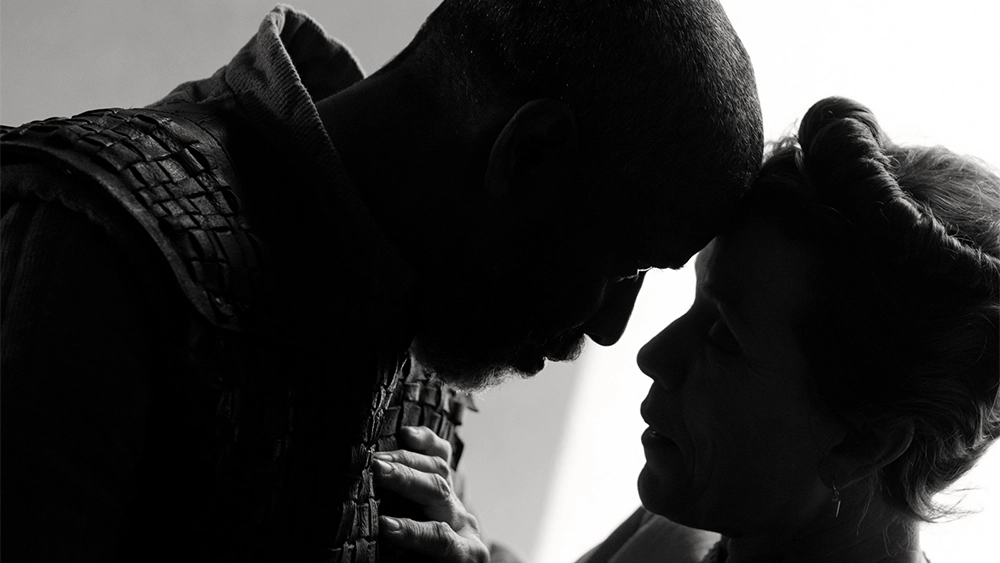
The Tragedy of Macbeth. Joel Coen’s thrilling cinematic adaptation of Shakespeare’s “Scottish play” is visually stylistically extreme. The stark and stunning production design of Stefan Dechant and the luscious black & white cinematography by Bruno Delbonnel– it all seems haunted by German Expressionist cinema. Scene after scene startles with inventiveness, but never obscures the text thanks to a brilliant cast. Denzel Washington gives a towering performance as the power-mad Macbeth. It’s hard to imagine anyone having the kind of bigger-than-life presence on screen to stun in scenes when he starts to unravel, bellowing madly in empty, arched hallways. He’s truly great. Frances McDormand is a chilling Lady Macbeth. She exudes the ferocity and cunning of her character but when she’s with Denzel their conspiratorial plotting almost has an erotic texture. When you get to her mad scene you see the whole arc of her bloodthirsty ambition and its tragic end. The rest of the cast is absolutely peerless in this powerful yet artistic triumph.
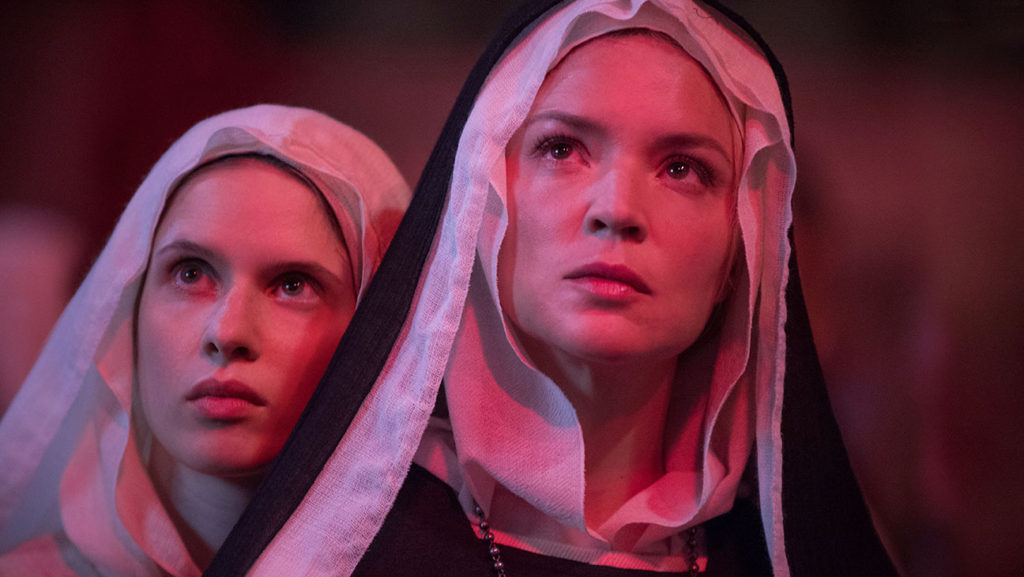
Benedetta. When I first heard Paul Verhoeven had directed a movie about a real-life Italian 17th-century lesbian nun, I thought it was to be a nunsploitation Showgirls. But it’s actually a terrifically entertaining movie. Young Benedetta, a gift to the Italian nunnery from her parents, is willful and pious from the beginning, convinced her calling is something celestial. And her first night at the convent a giant statue of the Virgin Mary falls on her and she emerges from underneath without a scratch. In later years (now played by the luminous Virginie Efira) she is visited by visions of Jesus, has religious fits and even bleeds from her palms Stigmata-like. But Mother Superior (a sardonically spectacular Charlotte Rampling) is suspicious and skeptical of her “gifts” and takes to spying on her, catching Benedetta in a torrid affair with another novice Bartolomea (Daphne Patakia), even pleasuring themselves with a wooden dildo carved from a religious statue. A beautifully crafted period piece punctuated with wild bursts of perverse humor and stinging satire, this isn’t so much blasphemous as fiendishly subversive.
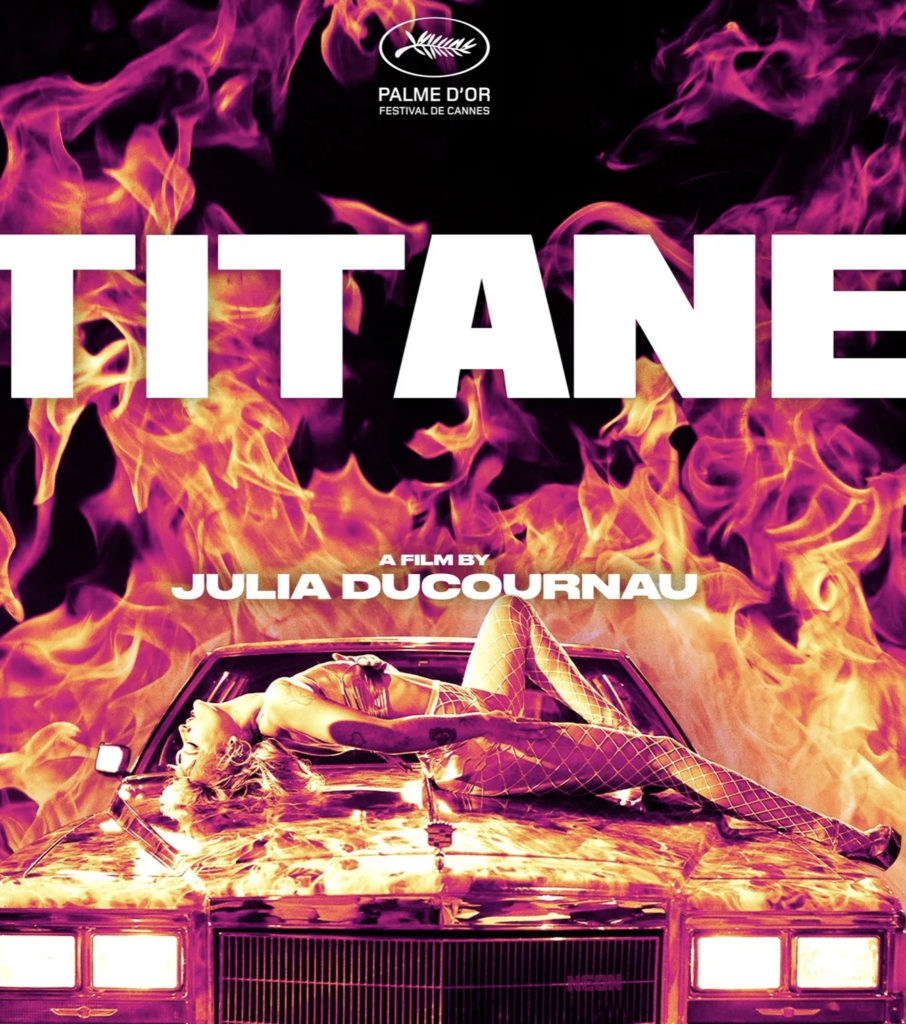
Titane. The fabulously fucked-up second feature film by director Julia Ducournau (Raw) begins with pure female rage. A young girl- Alexia- keeps kicking aggressively from the back seat of a moving car, aiming at her father at the wheel. It causes an accident and a titanium implant is put in her head. Years later we see an older, even angrier Alexia (fearless Agathe Rousselle) with a job dancing lewdly on top of custom cars and stabbing (with a metal hair rod) those who dare ask for an autograph. She gets fucked by a car (you read that right). Goes on the run from the law. Cuts her hair. Binds her breasts with tape and smashes her nose in a restroom so she can pretend to be the missing child of a fireman captain named Vincent (Vincent Lindon). Vincent has been so grief-stricken over his loss of his son Adrian he is willing to believe anything about this imposter. He even enrolls “Adrian” into his fire department. It’s even madder than that, but it all has a sense of deranged logic. Scene after scene fries your brain. And I won’t ruin it but there’s a sequence where someone is given mouth-to-mouth resuscitation to the “Macarena.” A deliriously demented treasure.
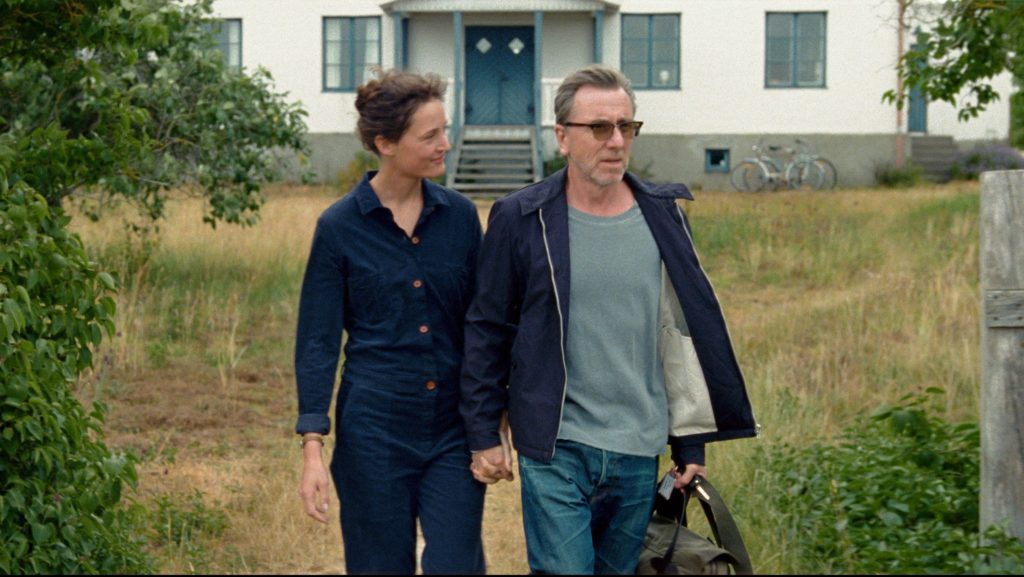
Bergman Island. Tim Roth plays Tony, an acclaimed filmmaker traveling to Faro island in Sweden, where legendary director Ingmar Bergman once lived, loved and filmed. Vicky Krieps plays Tony’s partner Chris, who is working on her own screenplay and having a difficult time with it. They attend seminars and “safaris” about Bergman, screen a movie at his private screening room and eventually tour his amazing seaside home. They are also renting the house where Bergman filmed Scenes from a Marriage so they wisely decide not to sleep in the main bed. What’s so magical about this new film by Mia Hansen-Love is the way this plays out, exploring the relationship between Tony and Chris and weaving in the legacy of Ingmar Bergman who haunts the island of Faro. When Chris decides to reveal the plot of her screenplay “The White Dress” the movie shifts into that film where Mia Wasikowska as Amy is traveling to Faro for a wedding and runs into her old ex-lover Joseph (Anders Danielsen Lie). They rekindle their romance over the tumultuous three-day-weekend, but how to finish the film is Chris’s dilemma. There’s a lovely meta approach to the movie that finally settles in and the end result is almost transcendently beautiful.
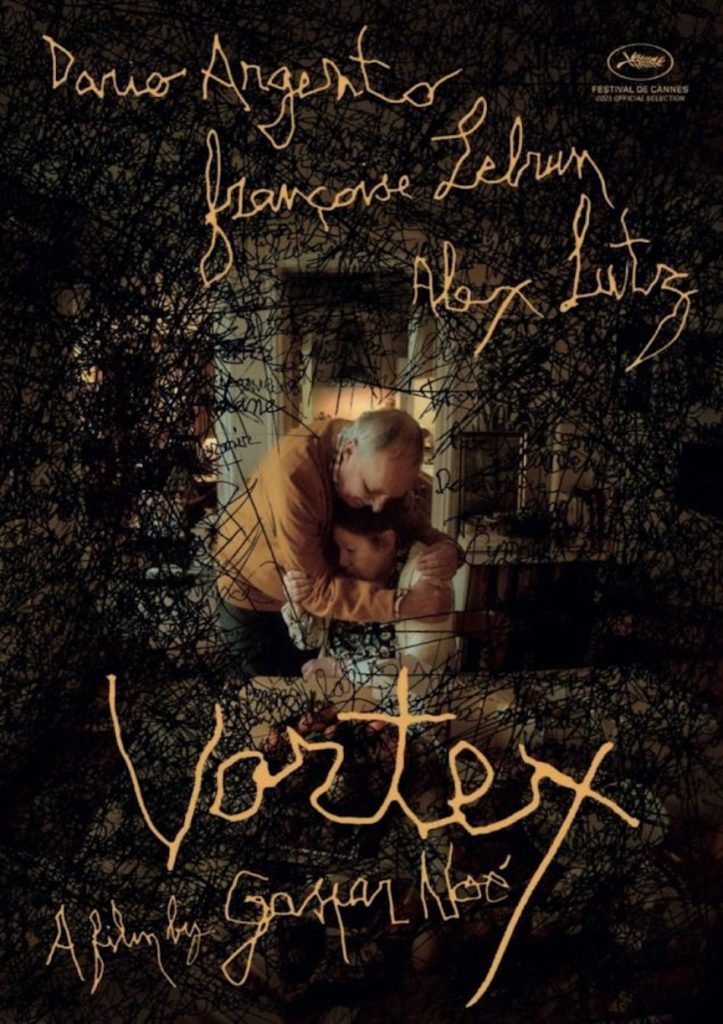
Vortex. Gaspar Noe’s new film is a shattering portrait of an elderly couple shakily hanging on by a thread in their cluttered, lived-in flat. The great Italian director Dario Argento plays the husband, with heart problems and attempting to write a book about dreams and cinema, while his dementia-addled wife (Francoise Lebrun/The Mother and the Whore) wanders around the apartment agitated and confused. Their son (Alex Lutz– excellent) has serious problems of his own and is raising a little boy. He tries (in vain) to talk them into moving to an assisted living center because they just can’t take care of themselves. But their love, their history is in this apartment. The tragedy is that their vibrant lives are now cruelly diminished by old age. Dario Argento plays with great warmth and intellectual acuity- he treats his failing wife with weary exasperation but compassion. Francoise Lebrun is just astonishing- this is a harrowing performance. As grueling as all this is, Noe frames it in split screen and artful ways, and with great tenderness as well as sadness. The finale is one of the most poignant and profound I have seen on film in many years.

The Velvet Underground. An artful, dazzling, thrillingly cinematic documentary by Todd Haynes about the seminal art-rock band The Velvet Underground. Haynes uses a trippy multi-screen approach mixing underground films alongside interviews with surviving band members, friends, relatives and those in the 60’s scene. I remember seeing The Velvet Underground multiple times at the Boston Tea Party and I remember the ecstatic thrill of watching Maureen Tucker walk in and nail down her drum set. Then the band would saunter onstage- Sterling Morrison on guitar, John Cale on viola and Lou Reed at the microphone and then the band would explode to life. It really was exciting to hear Reed’s gritty lyrics and throaty growl, evoking the dark poetry of Rimbaud and Hubert Selby Jr. with songs about drugs, S & M and urban malaise. The documentary charts how the band came together and how Andy Warhol promoted them and designed the outrageous album cover art- with a banana skin to be peeled down to reveal a purple banana. Warhol also forced the band to include the cool German beauty Nico, whose ghoulish, deadpan delivery actually suited the band’s alternative mystique. Nico only lasted for the first album and went on to record her own unique music (often produced by John Cale). The chronicle of the band’s fractious fallings out is rather heartbreaking when you hear the discordant, visionary rock music in the background. A truly audacious labor-of-love by Todd Haynes.
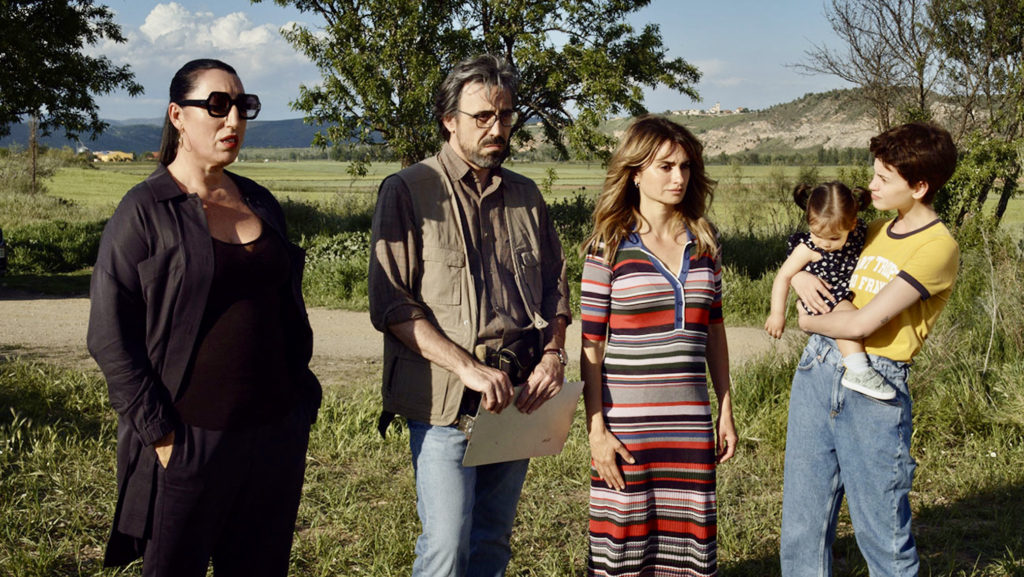
Parallel Mothers. This exquisite, intensely moving new film by Pedro Almodovar stars Penelope Cruz as Janis, a highly-regarded photographer in Madrid. While shooting a handsome archeologist Arturo (Israel Elejalde), she asks his help with a dig in her family’s village to reveal all the men that were dragged out of their homes by authorities and shot, killed and buried in unmarked graves during the Francisco Franco reign. Her affair with him produces a baby and she finds herself at the hospital with another woman- Ana (Milena Smit), giving birth as a single mother at the same time. Their lives become inextricably bound by fate. Played rather straightforward without the usual stylistic flourishes, but still packing a major punch thanks to a stunning performance by Penelope Cruz, who has evolved through the years into an amazing actress. The sublime Rossy de Palma shows up as Janis’s best friend which is an added treat. Pedro has been focusing on unconventional families for years, usually ones nurtured by a strong matriarchal unit with men nowhere to be found. But this film adds a bittersweet political undercurrent- that we should never forget oppression and political tyranny responsible for those loved ones forever missing from the dinner table.

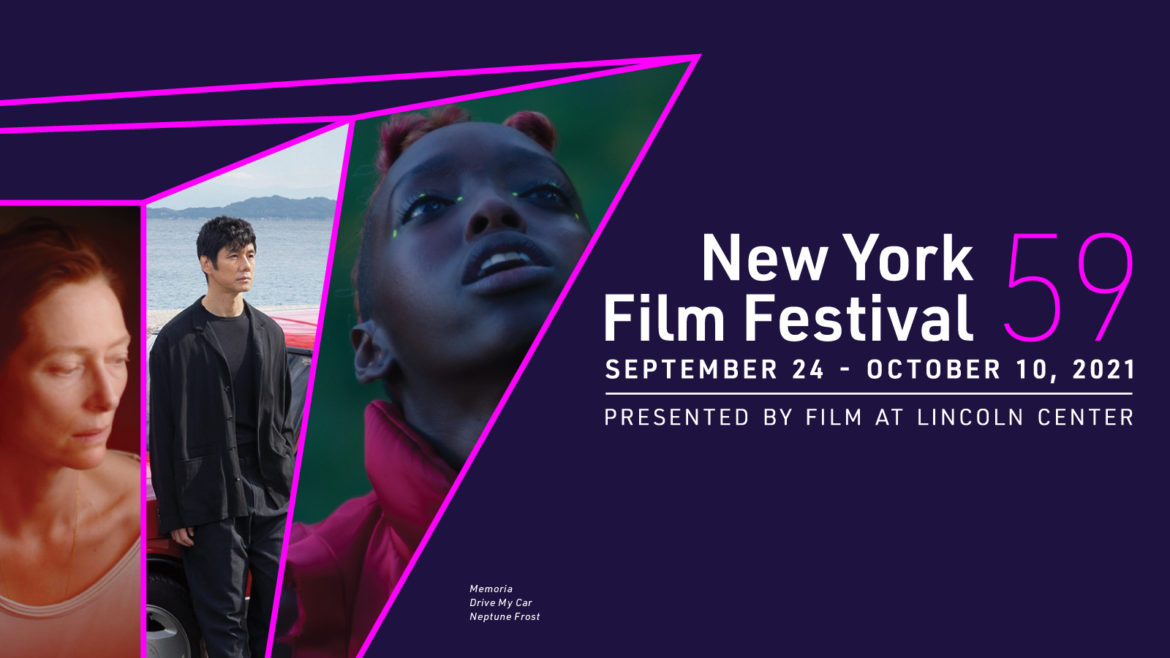
Thank you, Dennis. These reviews make me want to see every single film. What’s more, I know that I won’t be disappointed.